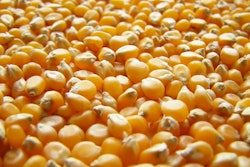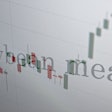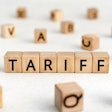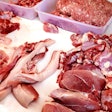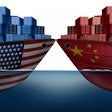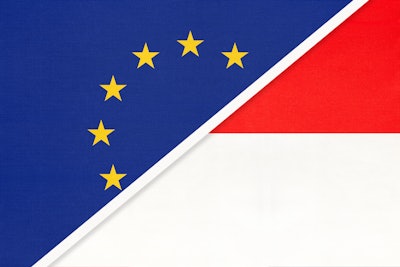
The European Union (EU) and Indonesia have concluded a Comprehensive Economic Partnership Agreement (CEPA), which has received cautious approval from one EU farming organization.
The first reaction of the joint association of European farmers and the region’s agricultural cooperatives, Copa-Cogeca to this latest trade agreement is positive.
The body foresees potential opportunities for some agrifood sectors in the EU. However, it sees the key benefits of the CEPA will be the lifting of non-tariff barriers, and the simplification and acceleration of export processes for European partners.
Still to see the detailed text of the deal, Copa-Cogeca has welcomed the proposed ongoing protection for certain products including rice, sugar, ethanol and eggs. Furthermore, it fully supports the maintenance of EU standards for animal and plant health, as well as food safety. The protection of European Geographical Indications (GI) under the CEPA has also been noted by the organizations.
For EU farmers and cooperatives to obtain full benefits of the new trade deal with Indonesia, the joint association has urged the European Commission (EC) to ensure that the Indonesian market is fully opened for EU agrifood exporters and supported by promotion efforts, as well as securing GI protections and encouraging contacts with Indonesian buyers.
Copa-Cogeca responded more cautiously to the announcement of a trade agreement between the EU and the Mercosur bloc this month. That deal was seen in a more positive light by the European dairy association.
Commission: CEPA creates new opportunities for EU farming
The EU-Indonesia CEPA is the end result of a series of negotiations that began in 2016, according to the EC. After political agreement two months ago, final negotiations between the parties have now been completed.
For EC President Ursula von der Leyen, the deal represents opportunities for diversification, partnerships, EU jobs, and economic growth. Set to reap the benefits of the CEPA are key industrial sectors — automotive, chemicals and machinery — as well as agrifood.
“Our deal with Indonesia creates new opportunities for businesses and farmers in a major and growing economy,” she said. “This also provides us with a stable and predictable supply of critical raw materials, essential for Europe’s clean tech and steel industry.”
Last year, EU agrifood exports to Indonesia were worth an estimated EUR1 billion (US$1.2 billion).
Among the most significant changes under the new CEPA will be the removal of tariffs on exports of the majority of the region’s agrifood exports to Indonesia. This will apply to dairy products (such as milk powders, cheeses and infant formula), poultry meat and beef.
However, to protect EU producers, there will be no liberalization for sensitive agrifood products such as rice, sugar, eggs and ethanol under the new agreement. For these products, tariffs and quota will remain in place.
New partners’ markets complementary
Adverse impacts on the EU agrifood market are expected to be negligible, according to the EC. This, it explains, is because Indonesian and European agrifood production are largely complementary.
Indonesia’s main exports to the EU in this category are palm oil, cocoa and coffee — none of which are produced in the EU. In contrast, the EC states, chief exports of the EU to Indonesia are dairy and other animal products.
European Commissioner for Agriculture and Food, Christophe Hansen, summed up the latest CEPA with Indonesia as one based on fair competition and a level playing field.
“Our producers will now enjoy preferential access to a market of 285 million consumers, who will have even greater opportunities to discover our high-quality food,” he said. “Already worth EUR1 billion annually, our exports to this important partner are set to grow further. As with every trade agreement, we have drawn clear red lines to safeguard our farmers.”
A further benefit of the CEPA is the potential to offset tariffs raised for both of the new trading partners by the U.S. according to Reuters.

